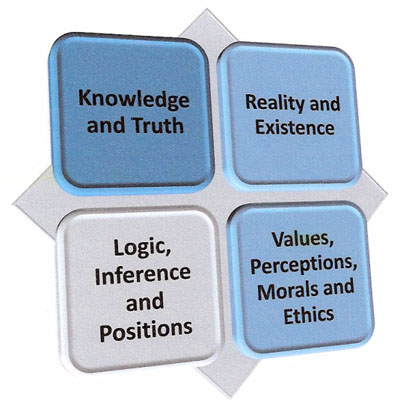Research
|
Interested in submitting an article to KON FORUM? Papers are now being accepted for review. |
|
Kappa Omicron Nu
|
||||||||||||||||||||||||||||
|
Positivistic |
Post Positivistic |
|
Methodology
|
Empirical Scientific |
Interpretive (Humanistic) |
Critical (Power) |
Intent |
Predict, control, explain |
Understand |
Emancipate |
Four AXIOMS
Epistemology (what counts as knowledge and ways of knowing (criteria for evaluating knowledge); how should we study the world; what is meaningful evidence or insights; how does knowledge arise) |
1. the one truth is out there waiting to be discovered via the scientific method 2. knowledge is objective (bias free) 3. only knowledge generated using the scientific method is valid
|
1. truth is created and there is more than one truth; relies on humans’ interpretations of their world 2. knowledge is subjective or intersubjective and includes perspectives 3. there are many ways of knowing and generating knowledge aside from the scientific method |
1. truth is grounded in the context, in social and historical practices 2. knowledge is emancipatory, created through critically questioning the way things “have always been done” 3. knowledge is about hidden power structures that permeate society |
Ontology (what should be the object of the study; what is human nature; what does it mean to be human; what counts as a meaningful statement about reality; how do people make choices; what is the nature of reality; how can reality be meaningfully portrayed) |
1. reality is out there; the world is a universe of facts waiting to be discovered 2. there is a single reality made of discrete elements: when we find them all through the scientific method, we have a full picture of reality 3. true nature of reality can only be obtained by testing theories |
1. reality is in here (in people’s minds and collectively constructed) 2. social reality is relative to the observer; it is determined by how people see themselves 3. reality is socially constructed via the lived experiences of people |
1. reality is here and now 2. reality is shaped by ethnic, cultural, gender, social and political values and mediated by power relations 3. human beings have the capacity to create a new reality by exercising control over social arrangements and institutions
|
Logic (how do people come to their understandings; what is acceptable as rigour and inference in the development of arguments, judgements, insights, revelations, or social action) |
1. deductive, rationale, formal logic 2. goal of research informed by this logic is replication and theory testing leading to control, prediction and explanations
|
1. inductive logic, attempting to find various interpretations of reality and recognize patterns that govern and guide human behaviour 2. goal of research informed by this logic is a credible representation of the interpretations of those experiencing the phenomenon under study |
1. inductive logic, aimed at emancipation and attempt to reveal ideologies and power relationships leading to self-empowerment and emancipation 2. goal of research informed by this logic is to reveal power relationships leading to changes in the status quo and more autonomy, inclusion and justice |
Axiology (role of values and perceptions; role of researchers and participants; how is what is studied influenced by the researcher and the participants; what is the relationship between the researcher and the participants) |
1. values neutral (values are often ignored)—moral issues are beyond empirical investigation 2. no place for bias, values, feelings, perceptions, hopes or expectations of either researcher or participant 3. relationship between researcher and participant is objective and dualistic (separate with no interchange) |
1. values laden 2. bias, feelings, hopes, expectations, perceptions and values are central to the research process 3. relationship between the researcher and participants is intense, prolonged and dialogic (deep insights through interaction and dialogue) |
1. values oriented and values driven 2. researcher’s proactive values concerning social justice are central to the research 3. relationship between researcher and participants is dialogic, transactional and dialectic (transformative) |
Transdisciplinary Methodology
Basarab Nicolescu (2001, 2008b), a Romanian quantum physicist, is the leading advocate of the transdisciplinary (TD) methodology. Like Brown (1993) did for home economics, “he seeks to address head on the problem of fragmentation that plagues contemporary life” (Voss, 2002, p. 114), including binary logic, dualism, value-free knowledge generation, hyper-specialization, and over-reliance on the old Newtonian empirical sciences. Within this scientific mindset, generations of home economists became comfortable with being experts, with working within their own discipline, and especially with being specialists within home economics sub-disciplines (hyper-specialization). They became adept at assuming their picture of family reality is incomplete, made up of many separate parts. If they can just conduct enough experiments and develop enough theories about this singular reality, they will eventually find all of the parts and complete the picture of reality. To varying degrees, home economists appreciate the merit of a role for values in their research and of critical science in their scholarship (McGregor, 2007, 2009b).
Unlike the old sciences, TD methodology is deeply informed by the new sciences of quantum physics, chaos theory, and living systems theory (Nicolescu, 2006). He believes that the innovations of the new sciences radically change what is acceptable as knowledge, reality, logic and the role of values. To that end, he tendered his own interpretation of the three pillars (axioms) of a transdisciplinary methodology: (a) ontology—multiple Levels of Reality, (b) the Logic of the Included Middle, and (c) epistemology—knowledge as an emergent complexity. McGregor (2009c, 2010a) and Cicovacki (2004, 2009) added axiology as the fourth TD pillar1, which McGregor labelled integral values constellation (see Figure 2).
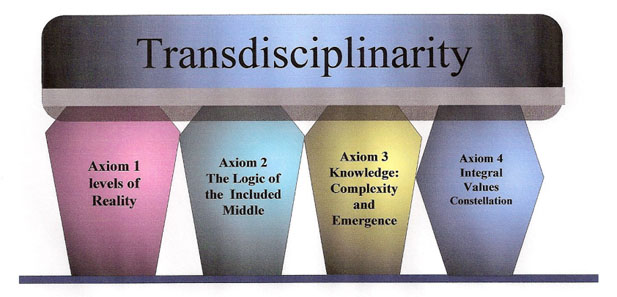
Figure 2. Four pillars (axioms) of transdisciplinary methodology.
As a caveat, what follows is but a map of the vast intellectual territory of transdisciplinary methodology. This brief paper cannot do justice to this phenomenally large idea; rather, it serves to whet the appetite for more. Practitioners are invited to read and engage in wider conversations about what this methodology might mean for home economics practice. All members of the profession have an abiding obligation to generate new knowledge to enhance family well-being and quality of life; TD methodology is the most recent innovation for that task.
Transdisciplinary Reality (Ontology)
Transdisciplinarity assumes that it is essential to seek multiple perspectives on any human problem (or set of human problems) because the intent is to integrate many levels of truth while generating new knowledge. It respects the complex and dynamic relationships among 10 different realities organized along three levels of reality: (a) the internal world of humans, where consciousness flows (comprising political, social, historical, and individual realities); (b) the external world of humans where information flows (comprising environmental, economic, and cosmic/planetary realities); and (c) The Hidden Third. People’s experiences, interpretations, descriptions, representations, images, and formulas meet on this third level. Three realities exist in this intuitive zone/level, this mediated interface: culture and art, religions, and spiritualities. Together, they form TD ontology (see Figure 3). Each of the 10 realities along three levels is characterized by its incompleteness; yet, together, in unity, these realities generate new, infinite knowledge (Nicolescu, 2006).
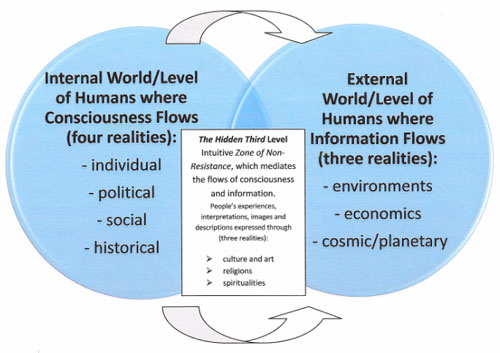
Figure 3. Three levels and ten types of transdisciplinary reality (ontology)
Although this idea may feel similar to human ecology’s concept of reciprocal relationships among levels of environments, it is different in that it deals with the mediated flow of inner consciousness (perceptions) and technical information from different realities leading to a meeting of the minds in a Zone of Non-Resistance. In this space, people shed their resistance to truth informed by other realities and join these realities to generate complex, TD knowledge.
Transdisciplinary Logic
Each type of reality and each level of reality is governed by a different kind of logic (Nicolescu, 2008b). Logic is concerned with the habits of the mind that are acceptable for inference and reasoning when arguing one’s position on an issue. The tendency in higher education is to predicate knowledge generation on a mechanistic view that ignores human agency, values, creativity, and evolution (logic of exclusion) and on reductionist-based scientific inquiry (Nicolescu, 2008b). In academic life (and home economics is no exception), this logic manifests as separate departments, journals, library holdings, conferences, gatherings, forums, and professional associations.
In contrast to logic of exclusion, a TD methodology embraces Logic of the Included Middle. This inclusive logic enables people to imagine that the space between things is alive, dynamic, in flux, moving, and perpetually changing (rather than separate, empty, and void). It is in this fertile middle ground that transdisciplinary knowledge generation manifests itself. TD methodology has people stepping through zones of non-resistance (away from one worldview or notion of reality towards other views) onto a fertile, moving floor of the included middle where, together, they generate new transdisciplinary intelligence and knowledge through intellectual fusion (McGregor, 2004).
The logic of the included middle requires the creation of a non-threatening space for dialogue and knowledge generation. In this intellectual space, attempts are made to reconcile different logics for the sake of solving human problems. Using the logic of the included middle to move through the 10 different types of reality (by making space for contradictions and discontinuities in the three levels of realities) creates a permanent possibility for the evolution of new, TD knowledge (McGregor, 2004, 2006). McGregor (2009c, 2010a) employed the metaphor of a lava lamp to explain this idea of constant evolution. What is especially significant about the logic of the included middle is transdisciplinarity’s focus on what happens at the interface between higher education (academic disciplines) and the rest of the world. The generation of TD knowledge requires academics to connect with members of voluntary civic and social organizations and institutions (civil society) as well as with the private and public sectors.
Transdisciplinary Knowledge (Epistemology)
A TD methodology assumes that what counts as knowledge has to expand beyond that generated using the scientific method or just interpretive or critical methodologies. It has to include the complex structure of understandings garnered through intricate webs of relations among individuals in the academy, the private and public sectors, and in civil society (on the fertile middle ground). Horlick-Jones and Sime (2004) coined the phrase border-work to refer to the intellectual work that occurs when people living on the borders of the academy (university disciplines) and civil society engage in knowledge generation to address complex problem solving. TD knowledge is thus based on cross-fertilization, embodiment, complexity, and emergence (see Figure 4), comprising the crux of TD knowledge.
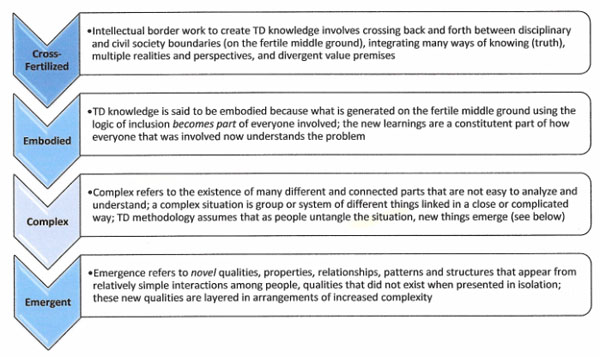
Figure 4. Four dimensions of transdisciplinary knowledge (epistemology)
Complexity. Because TD draws its notions of complexity and emergence from the new sciences, a different understanding of these familiar words is required. Complex is Latin complexus for surrounding, encompassing, and French complexe, composed of parts (Harper, 2010). TD methodology assumes there is a difference between a complex problem and a complicated problem. The most complex problems facing humanity are characterized by high levels of uncertainty, multiple perspectives, and multiple, interlinked local and global processes–they are complex. A prime example is climate change. Specialized experts are unable to make the necessary connections to deal with this complexity (Apgar, Argumendo, & Allen, 2009). A complicated problem, on the other hand, is characterized as hard to solve because it is intricate, tangled, knotty, and detailed.
It is one thing to untangle the strings of a complicated problem but quite another to re-weave these freed up strings, along with new strings brought to the fertile middle ground by a collection of stakeholders, into a whole to achieve a new, integrated solution, one that employs newly generated TD knowledge. The latter process is an inherent part of solving a complex problem and features the concept of emergence (McGregor, 2010a; Nicolescu, 2008a).
Emergence. Emerge has Latin roots, emergere, for rise out or up, bring forth, bring to light (Harper, 2010). Transdisciplinary methodology holds that the process of emergence comes into being as people pass through the zone of non-resistance (accept that there are many realities, perspectives, and value premises) and enter the fertile middle ground to problem solve using the logic of inclusion. Emergence refers to novel qualities, properties, relationships, patterns, and structures that appear from relatively simple interactions among people, qualities that did not exist when presented in isolation. These new qualities are, themselves, layered in arrangements of increased complexity (Morin, 2005; Nicolescu, 2008a). Emergence means people assume the problem they are addressing continually changes as people try to jointly solve it (McGregor, 2009c). TD knowledge is created in the fertile middle ground, emerging from gradual cross-fertilization; that is, everything is in perceptual motion: all ideas, information, relationships, and people. This motion results from the itinerant convergence of different actors and their ways of knowing, shaped by their respective expertise or disciplinary axiomatic and value premises (Nicolescu, 1997).
Integration and Cross-fertilization. TD knowledge emerges through the process of integration, understood to mean opening things up to all disciplines and to civil society—knowing so that something new can be created via synthesis and the harmonization of ideas and perspectives (different realities) (Nicolescu, 1997). Those co-creating TD knowledge would come to welcome chaos, uncertainty, and tension, along with emergence and complexity (Nicolescu, 2006). Thus, learning to apply these notions will be required for using TD methodology and generating knowledge. TD intellectual border work leads to personal and disciplinary growth and evolution, necessitating tension and imbalance. Those creating TD knowledge would not try to maintain the old order but would enter into trustful, sharing relationships with others who have the same vision and relevant information. Through rich processes and exchanges, multiple minds would interact and produce a complex knowledge containing circular relationships between cause and effect (reflexivity). This knowledge creation process is rich with value orientations.
Transdisciplinary Values (Axiology)
By its very nature, transdisciplinary dialogue will witness the inescapable value loading of every inference, every opinion; every line of conversation will face a potential clash of values, ethics, and morals (Cicovacki, 2009; McGregor, 2009c, 2010a). Bazewicz (2000) affirmed that TD methodology is concerned with the integration of values. Working together in fluctuating, enriching, and challenging relationships necessitates a concern for values, especially because complexity and emergence (TD epistemology) infer the need for more than a single expert’s perspective and notion of truth. Transdisciplinarity needs value-steered processes to lead to multiple truths; its attendant TD knowledge generation depends upon it (Burger, 2003). The solutions for complex, emergent human problems require the knowledge of, and partnerships with, experts from different scientific disciplines, from the private and public sector, and from civil society (e.g., children, elders, indigenous peoples, artisans, labour, faith). The capacity to solve complex, emergent problems in the fertile middle ground using inclusive logic is generated through these relationships, and this compilation and integration of different world views and value orientations must be managed and lead to mitigate conflicts.
Summary and Discussion
The intent of this paper was to augment Daniels’ (1980) and Brown’s (1993) notions of transdisciplinarity in home economics with a 21st century notion of transdisciplinarity as methodology. To reiterate, methodology is concerned with the application of taken-for-granted laws and principles (axioms) of what counts as knowledge (truth), reality, logic, and values. Table 1, which profiles the three conventional methodologies, can be used as a point of comparison for the overview of the TD methodology. Figure 5 summarizes the four axioms of TD methodology (relative to the general axioms set out in Figure 2 and Table 1).
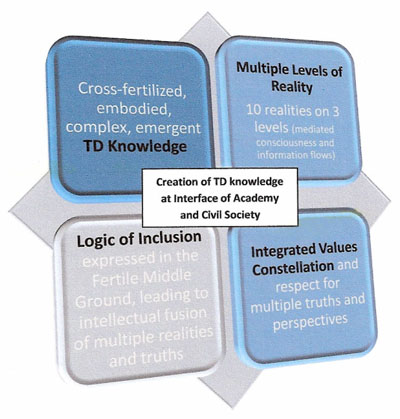
Figure 5. Four transdisciplinary methodology axioms
In summary, if home economists employed a transdisciplinary methodology, they (a) would crisscross disciplinary and sub-disciplinary boundaries with the intent to change (or remove) the borders while integrating theories, policies, and practices emanating from this disciplinary migration and integration. (b) They would recognize that leadership for home, families, and humanity happens in the fertile middle ground within the academy and among higher education, civil society, and other sectors. (c) This leadership would be informed by the logic of inclusion and by multiple levels of reality. They would find new respect for tension, chaos, and disorder, (d) especially as they manage the value-laden transdisciplinary dialogue inherent in intellectual fusion and perspective integration. (e) Home economists would appreciate that resultant TD knowledge is complex, emergent, cross-fertilized, and embodied. (f) They would integrate the many realms of reality (multiple perspectives and logics) as they worked with other disciplines and members of civil society in intellectual border-work to generate TD knowledge to address the context of 21st century humanity.
The aim of transdisciplinarity is the comprehension of the present world, of which one of the imperatives is the unity of knowledge. Using a TD methodology gives people “the freedom of thinking beyond disciplinary boundaries” (Berni, 2010, p. 6). This freedom was curtailed with the birth of Modern Science and the evolution of the sciences independently from theology, philosophy, and culture. Berni explained that the extreme consequences of that division have lead to the current human condition and the self-destruction of the human species and the entire earth ecosystem. A transdisciplinary methodology advocates for reconciliation among science, spirituality, art, and morality. Through the four axioms—multiple levels of reality and perceptions, value constellations, emergent and complex knowledge, and the logic of inclusion (see Figure 5)—humanity can work together to achieve its potential.
Readiness for TD Methodology
If the experience of the author is any example, accepting the four TD axioms as “taken-for-granted” will be an intellectual stretch but a welcomed addition to how to be a home economist. There are both bridges and obstacles shaping the shift from current ways of knowing and knowledge creation to transdisciplinary methodology. First, home economics is interdisciplinary; yet, this means working with other disciplines with no intention of removing the boundaries (Fairclough, 2005). We have historically worked with members of civil society, acting as a buffer between citizens and government and business; however, this role often involved technical solutions to symptoms instead of changing policy or other social institutions that support families. A TD methodology asks us to unite these two things together—take down the boundaries within university disciplines at the same time we take down the boundaries between the university and the rest of the world.
Second, we have always had a deep respect for the role of values in solving complicated family problems, and some home economists have internalized the concepts of practical, perennial problems and three systems of action, as well as values reasoning (see McGregor et al., 2008). A TD methodology asks us to see values as an integral part of solving complex, emergent problems, in addition to familiar, complicated problems. Solving complex problems of humanity (with emergent potential) with other stakeholders is a different twist for us, given our penchant to work one-on-one with individual families. However, a values-driven problem solving process should come naturally to us.
Third, although the TD methodology values many levels of reality, home economists are most comfortable with the idea of a singular reality, understood by using facts produced from the scientific method. Others are beginning to endorse the idea (a) that reality is socially constructed by those who are living it (interpretive) and (b) that current reality is shaped by societal power relations, often leading to oppression and marginalization (critical methodology). Accepting that there are 10 realities that have to be integrated during the solution of complex, emergent problems may be an intellectual stretch for many in the profession. This is a daunting proposition. On the other hand, as mentioned, we are very comfortable with a human ecosystem approach with its focus on reciprocal relationships between levels of environments. The environments include family, human built, and natural, and they encompasses labels similar to those set out in Figure 3. A TD methodology further requires us to integrate the inner flow of consciousness with the outer flow of information. In this way there can be a meeting of the minds on the fertile middle ground informed by the logic of inclusion (instead of exclusion).
Fourth, regarding the logic of exclusion, although home economists are deeply familiar with dualism, specializations, and fragmentation, they also have been taught to value reciprocal relationships, systems thinking, and principles of interconnectedness, holism, and integration. Moving to the logic of inclusion, one that values many voices working together to solve the pervasive problems of humanity, is not a big intellectual leap.
Finally, home economics leans heavily towards the empirical methodology, but more and more it is seeing the merit of interpretive and critical methodologies. A TD methodology, while valuing the contributions of the other methodologies, asks people to move from prediction and control, from understanding people’s lived experiences, and from emancipation to understanding the world and to do so by addressing problems of humanity, rather than just the symptoms. The problems of humanity include: the human condition, issues that have global implications, human freedom and justice, self-determinism, harmonious access to and distribution of resources, human and bio sustainability, power relationships, human aggression, human development, human empowerment and potential, and the import of ideologies and paradigms (Nicolescu, 2001).
Transdisciplinary Tipping Point
This aspect of TD methodology will be most challenging to home economists who have become comfortable with being technical experts dealing with symptoms (McGregor et al., 2004) instead of delving into the deeper ideological and paradigmatic underbelly of the human condition. But, it behooves us to try, despite our comfort level with current approaches to generating knowledge, to help individuals and families. Historically, every major scientific breakthrough (old or new sciences) began with an idea that threatened to overturn existing beliefs, including what counts as knowledge, reality, logic, and values. But, eventually the purveyor of the new idea(s) finds believers and the number of believers reaches a critical mass. When this happens, perceptions are transformed and a new approach to knowledge, reality, logic, and values is born.
Such was the case with each of interpretive and critical methodologies, and such will be the case for transdisciplinarity. Ken Wilber referred to the tipping point to capture this process. He asserted that when the leading edge of the development of a new idea reaches 10 percent of the population, a transformation occurs, and the idea becomes diffused throughout the entire culture (Volckmann, 2010). If just 10 percent of the world’s 10,000 or more home economists were receptive to the idea of transdisciplinary methodology, a tipping point could be achieved in the profession; this equates to only 1,000 practitioners, equivalent to 10 in each of 100 countries. “Even though only about 10% will actually be embracing [the new ideas], that 10% will profoundly alter social institutions as we know them, and that impact is going to occur worldwide” (p. 3).
The profession can, and needs to, make this intellectual leap. As our world becomes more interlinked, our problems become more complex, and their solutions are more difficult to grasp. This means we have to move beyond interdisciplinarity and the three conventional methodologies towards a transdisciplinary methodology. “Dealing with complex societal problems requires knowledge across all aspects of society: research disciplines, [the private sector], communities, civil society, and governments” (Apgar et al., 2009, p. 4). Home economists work in all of these areas—we are poised to make profound changes to benefit individuals and families, indeed all of humanity and the planet. With a transdisciplinary methodology, we can become “a weight-bearing pillar that undergirds society” (Horn, 1981, p. 21).
References
American Heritage Dictionary (4th Edition). (2010). Boston, MA: Houghton Mifflin Co.
Apgar, J., Argumendo, A., & Allen, W. (2009). Building transdisciplinarity for managing complexity. International Journal of Interdisciplinary Social Sciences, 4(5), 255-270.
Bazewicz, M. (2000). The axiological foundation of the nature value of information. In C. Hofer and G. Chroust (Eds.), The 10th Fuschl Conversation (pp. 67-74). Vienna, Austria: International Federation for Systems Research. Retrieved from http://wwwu.uni-klu.ac.at/gossimit/ifsr/fuschl/f2000/g4/g4_ip_1_final.pdf
Berni, L. E. V. (2010). The transdisciplinary connection. The Rose Croix Journal, 7. Retrieved from http://www.rosecroixjournal.org/issues/2010/articles/vol7_01_12_berni.pdf
Brown, M. (1993). Philosophical studies of home economics in the United States: Basic ideas by which home economists understand themselves. East Lansing, MI: Michigan State University Press.
Burger, P. (2003). Non-epistemic values and scientific knowledge. In W. Löffler and P. Weingartner (Eds.), 26th International Wittgenstein Symposium Proceedings, Volume 11 (pp. 67-70). Kirchberg, Austria: Austrian Ludwig Wittgenstein Society.
Cicovacki, P. (2004). Transdisciplinarity as an interactive method: A critical reflection on the three pillars of transdisciplinarity. TRANS: Internet Journal for Cultural Sciences, 15(1). Retrieved from http://www.inst.at/trans/15Nr/01_6/cicovacki15.htm
Cicovacki, P. (2009). Transdisciplinarity as an interactive method. Integral Leadership Review, 9(5). Retrieved from http://www.integralleadershipreview.com/archives-2009/2009-10/2009-10-06-article-cicovaki.php
Daniels, C. E. J. (1980). The organizational structure of home economics: A consideration of terminology. Journal of Consumer Studies and Home Economics, 4(4), 323-339.
Fairclough, A. (2005). Critical discourse analysis in trans-disciplinary research on social change. Lodz Papers in Pragmatics, 1, 37-58.
Gephart, R. (1999). Paradigms and research methods. Online Research Methods Forum, 4 (Summer). Retrieved from http://division.aomonline.org/rm/1999_RMD_Forum_Paradigms_and_Research_Methods.htm
Harper, D. (Ed.). (2010). Online etymology dictionary. Lancaster, PA. Retrieved from Http://www.etymonline.com
Horlick-Jones, T., & Sime, J. (2004). Living on the border: Knowledge, risk and transdisciplinarity. Futures, 36(4), 441-456.
Horn, M. (1981). Home economics: A recitation of definition. Journal of Home Economics, 73(1), 19-23.
Jantsch, E. (1972). Inter-and transdisciplinarity university. Higher Education, 1(1), 7-37.
Kocklemans, J. (1979). Why interdisciplinarity? In J. Kocklemans (Ed.), Interdisciplinarity and Higher Education (pp.123-160). University Park, PA: Pennsylvania State University Press.
McGregor, S. L. T. (2004). Transdisciplinary research and practice. Kappa Omicron Nu Human Sciences Working Paper Series. Retrieved from https://kon.org/hswp/archive/transdiscipl.html
McGregor, S. L. T. (2006). Transformative practice. East Lansing, MI: Kappa Omicron Nu.
McGregor, S. L. T. (2007). International Journal of Consumer Studies: Decade review (1997- 2006). International Journal of Consumer Studies, 31(1), 2-18.
McGregor, S. L. T. (2009a). Integral leadership’s potential to position poverty within transdisciplinarity. Integral Leadership Review, 9(2). Retrieved from http://www.integralleadershipreview.com/archives-2009/2009-03/2009-03-article-mcgregor.php
McGregor, S. L. T. (2009b). Integral metatheory: Beyond specializations, theoretical pluralism and conventional metatheory. Family and Consumer Sciences Research Journal, 38(2), 142-157.
McGregor, S. L. T. (2009c). Transdisciplinary consumer citizenship education. Paper presented at 6th Consumer Citizenship Network Conference at Technical University of Berlin, Germany (pp. 107-121). Hamar, Norway: Hedmark University. Retrieved from https://www.hihm.no/content/download/10881/98014/file/Papers%20Berlin,%20full%20text.doc
McGregor, S. L. T. (2010a). Consumer moral leadership. The Netherlands: Sense Publishers.
McGregor, S. L. T. (2010b). Historical notions of transdisciplinary in home economics. Kappa Omicron Nu FORUM, 16(2). Retrieved from /archives/forum/16-2/mcgregor.html
McGregor, S. L. T. (2010c). Integral leadership and practice: Beyond holistic integration in FCS. Journal of Family and Consumer Sciences, 102(1), 49-57.
McGregor, S. L. T. (in press). Transdisciplinary consumption. Integral Review: A Transdisciplinary and Transcultural Journal, 6(4).
McGregor, S. L. T., Baranovsky, K., Eghan, F., Engberg, L., Harman, B., Mitstifer, D., Pendergast, D., Seniuk, E., Shanahan, H., & Smith, F. (2004). A satire: Confessions of recovering home economists. Kappa Omicron Nu Human Sciences Working Paper Series. Retrieved from https://kon.org/hswp/archive/recovering.html
McGregor, S. L. T., & Murnane, J. A. (2010). Paradigm, methodology and method: Intellectual integrity in consumer scholarship. International Journal of Consumer Studies, 34(4), 419-427.
McGregor, S. L. T., Pendergast, D., Seniuk, E., Eghan, F., & Engberg, L. (2008). Choosing our future: Ideologies matter in the home economics profession. International Journal of Home Economics, 1(1), 48–68.
Morin, E. (2005). Restricted complexity, general complexity. In C. Gershenson. D. Aerts and B. Edmonds (Eds.), Worldviews, science and us: Philosophy and complexity (pp. 5-29). London: World Scientific Publishing. E-chapter retrieved from http://www.worldscibooks.com/chaos/etextbook/6372/6372_chap01.pdf
Nicolescu, B. (1997, November). The transdisciplinary evolution of the university condition for sustainable development. Keynote delivered at the International Association of Universities’ Congress on Universities' Responsibilities to Society. Bangkok, Thailand: Chulalongkorn University. Retrieved from http://perso.club-internet.fr/nicol/ciret/bulletin/b12/b12c8.htm
Nicolescu, B. (2001). Manifesto of transdisciplinarity [Translated from French by Karen-Claire Voss]. Albany, NY: State University of New York Press.
Nicolescu, B. (2006). Transdisciplinarity - past, present and future. In B. Haverkott and C. Reijntjes (Eds.), Moving Worldviews Conference Proceedings (pp. 142-165). Leusden, the Netherlands: ETC/Compas. Retrieved from http://www.movingworldviews.net/Downloads/Papers/Nicolescu.pdf
Nicolescu, B. (2008a, July 13). The idea of levels of reality and its relevance for non-reduction and personhood. Opening talk at International Congress on Subject, Self, and Soul: Transdisciplinary Approaches to Personhood. Madrid, Spain: Universidad Pontificia Comillas. http://www.metanexus.net/conference2008/articles/Default.aspx?id=10502
Nicolescu, B. (Ed.). (2008b). Transdisciplinarity: Theory and practice. Creskill, NJ: Hampton Press.
Nicolescu, B. (2010). Disciplinary boundaries - What are they and how they can be transgressed? Paper prepared for the International Symposium on Research Across Boundaries. Luxembourg: University of Luxembourg. Retrieved from http://dica-lab.org/rab/files/2010/06/Paper-Nicolescu-Special-Issue.pdf (password protected).
Niglas, K. (2001). Paradigms and methodology in educational research. British Education Index, Education-line. Retrieved from http://www.leeds.ac.uk/educol/documents/00001840.htm
Ryan, K., & Cooper, J. (2007). Those who can, teach. Boston, MA: Wadsworth Cengage Learning.
Volckmann, R. (2010). The state of integral: A conversation with Ken Wilber. Integral Leadership Review, 10(5), retrieved from http://www.integralleadershipreview.com/archives-2010/2010-10/ILRkenruss.pdf
Voss, K-C. (2002). Review essay of Basarab Nicolescu’s Manifesto of Transdisciplinarity. Esoterica, 4, 114-116.
Footnote:
1 Basarab Nicolescu does not think there
should be an axiology axiom for TD methodology. He believes “we have to limit the number of axioms (or principles
or pillars) to a minimum number. Any axiom which can be derived from the already postulated ones, has
to be rejected” (2010, p.3). In personal correspondence with the author, he explained, “There
is no need for a 4th axiom of TD concerning values. From my point of view, the flux of information and
the flux of consciousness traversing not only the levels of Reality of the Object and the levels of Reality
of the Subject but also the region of the Hidden Third, necessarily engender values. These values collect
all the possible information from levels of Reality and the Hidden Third. The problem is, of course,
how the human being becomes conscious about these values. This implies human evolution. Any other values
seem to me partial and even against this general trend. Who will formulate the values for the 4th axiom?
Scientists? Philosophers? Religious people? An ideology? Of course, all of us believe in humanistic values.
We need a new humanism. I call it "transhumanism." Its values are engendered by Trans-Reality.
They are not human-made” (personal communication, Basarab Nicolescu, June 10, 2010).
![]()
Kappa Omicron Nu Forum Volume 16 No. 2
For further information about manuscripts:
![]()
Via
E-Mail
Dr.
Dorothy I. Mitstifer, Executive Director
Call
for Papers
